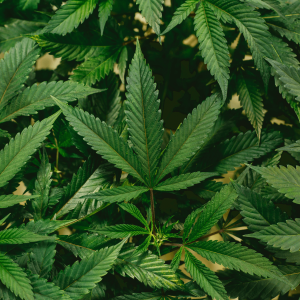Can cannabis make you lose weight? If you’ve found yourself asking this question, you’re not alone.
When you think about cannabis and weight, what’s the first image that pops into your head? For most people, it’s probably the classic “munchies” stereotype — someone lighting up and then raiding the fridge for chips, cookies, or anything edible in sight. Cannabis has long been linked to increased appetite and, by extension, potential weight gain. So, the idea that cannabis could actually help with weight loss might seem a little counterintuitive.
Yet, as cannabis research expands and wellness trends evolve, more people are asking: Can cannabis make you lose weight? Is it possible that certain compounds in the plant might influence metabolism, fat storage, or appetite control in ways that promote weight loss or healthier body composition?
This question matters because obesity and overweight issues remain major public health challenges worldwide. People are continually searching for safe, natural, and effective ways to manage their weight. Cannabis, with its complex chemical makeup and interaction with the body’s endocannabinoid system, has emerged as a topic of interest—not just as a recreational substance but potentially as a therapeutic tool.
In this blog, we’ll dive into what science currently says about cannabis and weight loss. We’ll explore how cannabis affects appetite and metabolism, the role of specific cannabinoids like THC and CBD, the risks and limitations, and whether cannabis can realistically be part of a weight management strategy.
How Cannabis Affects Appetite and Eating Habits
Cannabis’ reputation for causing the munchies isn’t just an urban myth; it’s a well-documented effect primarily driven by THC (tetrahydrocannabinol), the plant’s main psychoactive compound. THC binds to cannabinoid receptors in the brain, particularly in areas that regulate hunger and satiety, stimulating the release of hormones and neurotransmitters that increase appetite.
Studies have shown that after consuming THC, many medical marijuana users experience a significant increase in food intake, often craving calorie-dense, sugary, or fatty foods. This is why cannabis is sometimes prescribed to patients undergoing chemotherapy or suffering from conditions like HIV/AIDS, where appetite loss is a serious concern.
But the relationship between cannabis and appetite isn’t as simple as “more cannabis equals more eating.” Different cannabinoids interact with the brain in unique ways. For instance, CBD (cannabidiol), another major compound in cannabis, doesn’t produce a high and has been observed to reduce appetite or modulate it in some cases.
Some users report that certain cannabis strains or products can actually suppress their appetite or help control cravings. This variability may be influenced by:
- The ratio of THC to CBD in the product
- Individual biology and tolerance
- The method of consumption (smoking flower, edibles, tinctures)
- Psychological factors like mood and stress
Research consistently shows that THC stimulates appetite by enhancing the pleasure centers in the brain related to eating, which can lead to increased calorie consumption. However, not all cannabis users experience significant appetite changes, and the effect can diminish with regular marijuana use due to tolerance.

Cannabis and Metabolism: What the Research Shows
While increased appetite might suggest cannabis users would gain weight, interestingly, epidemiological studies have found the opposite trend: regular cannabis users often have lower body mass indexes (BMI) and reduced rates of obesity compared to non-users.
How does this paradox happen? The answer lies partly in the body’s endocannabinoid system (ECS), a complex network of receptors, enzymes, and signaling molecules that helps regulate metabolism, energy balance, and fat storage.
Cannabinoid receptors, especially CB1 receptors, are present not only in the brain but also in peripheral tissues like fat cells, the liver, and the digestive tract. When THC activates these receptors, it can influence metabolic processes in multiple ways:
- Fat Storage and Breakdown: Some studies in animals suggest cannabinoids can promote the breakdown of fat (lipolysis) and prevent excessive fat accumulation.
- Insulin Sensitivity: Cannabis may improve how the body responds to insulin, which plays a crucial role in blood sugar control and fat metabolism.
- Energy Expenditure: There’s evidence that cannabis can increase metabolic rate slightly, meaning the body burns more calories at rest.
Animal research supports some of these effects, showing that THC and CBD can alter fat cell function and reduce inflammation linked to obesity. However, these results are preliminary, and human trials remain limited.
Another explanation for cannabis users’ lower average BMI could be lifestyle differences, like more physical activity or different dietary patterns, though these factors don’t fully account for the trend.
In summary, cannabis appears to influence metabolism and energy balance in ways that might offset the increased calorie intake caused by the munchies, though the exact mechanisms are still under investigation.

CBD and Weight Management: Beyond the High
While THC grabs the spotlight for its psychoactive effects and appetite stimulation, CBD has quietly gained attention for its potential role in weight management and metabolic health.
CBD is non-intoxicating and interacts with the ECS differently than THC. Emerging research suggests CBD might help with:
- Reducing Fat Accumulation: Some studies indicate CBD promotes the conversion of white fat (which stores energy) into brown fat (which burns energy), a process called “browning.” This can increase calorie burning.
- Regulating Blood Sugar: CBD might improve insulin sensitivity and reduce insulin resistance, which is important for managing weight and preventing type 2 diabetes.
- Anti-Inflammatory Effects: Chronic inflammation is linked to obesity; CBD’s anti-inflammatory properties may help mitigate this.
For example, a 2016 study published in Molecular and Cellular Biochemistry found that CBD caused human fat cells to undergo browning, leading to increased fat burning. Another study in mice showed CBD helped reduce weight gain induced by a high-fat diet.
While promising, it’s important to note that research on CBD and cannabis-induced weight loss is still in early stages. Human clinical trials are scarce, and results can vary widely depending on dosage, delivery method, and individual factors.
CBD products also appeal to people who want the benefits of cannabis without the high, making them an attractive option for those interested in weight management.
Risks and Considerations: Why Cannabis Isn’t a Magic Weight Loss Cure
Despite some encouraging findings, it’s crucial to understand that cannabis is not a guaranteed or straightforward way to lose weight. Here are some important considerations and potential risks:
- Appetite Stimulation Can Lead to Overeating: For many, the munchies are real and can cause consuming more calories than usual, potentially resulting in weight gain rather than loss.
- Motivation and Activity Levels: Some cannabis users report decreased motivation or lethargy after consumption, which might reduce physical activity and counteract any metabolic benefits.
- Individual Differences: Genetics, tolerance, cannabinoid ratios, and even psychological factors all influence how cannabis affects appetite and metabolism. What works for one person may not work for another.
- Strain and Product Variability: Different cannabis strains and product types can produce very different effects on appetite and metabolism. Sativa-dominant strains are often linked to increased energy, while indica strains may promote relaxation and sedation.
- Legal and Health Concerns: Depending on your location, cannabis use may not be legal. Plus, cannabis is not without side effects or risks, especially with chronic use or in people with certain health conditions.
- Lifestyle Matters Most: Cannabis should not replace healthy eating habits, exercise, and medical advice. Weight management is complex and involves many factors beyond cannabis use.
In short, cannabis is a tool that may affect weight in complex ways, but it is not a magic bullet for weight loss.

Conclusion: Can Cannabis Help You Lose Weight?
So, can cannabis make you lose weight? The answer isn’t a simple yes or no—it’s nuanced and depends on many variables. Cannabis has a complex relationship with appetite and metabolism: THC can stimulate hunger and potentially increase calorie intake, but it might also boost metabolism and improve insulin sensitivity. CBD, meanwhile, shows promising potential in encouraging fat burning and reducing inflammation, though research is still early.
Epidemiological data suggest cannabis users tend to have lower BMIs on average, but this likely results from a combination of biological, lifestyle, and behavioral factors.
If you’re curious about using cannabis as part of a weight management plan, it’s wise to proceed thoughtfully. Start with low doses, choose products that suit your goals (like high-CBD or balanced THC:CBD strains), and always consider how cannabis fits with your overall diet and exercise habits.
As research continues to evolve, we’ll gain clearer insights into cannabis’ role in metabolism and weight regulation. For now, think of cannabis as a complex plant with multiple effects—some that might support weight management, others that could challenge it.
Ultimately, the best approach to weight loss remains a balanced diet, regular physical activity, and consultation with healthcare professionals. Cannabis might be a helpful piece of the puzzle for some, but it’s far from a standalone solution.
Frequently Asked Questions
1. Can cannabis help with weight loss?
Cannabis may influence weight through its effects on appetite and metabolism, but it’s not a guaranteed weight loss tool. THC often increases appetite, which can lead to eating more, while CBD shows potential for boosting metabolism and fat burning. Current research suggests cannabis has a complex, sometimes paradoxical role in weight regulation. It might help some people manage weight when combined with a healthy lifestyle, but it’s not a standalone solution.
2. Why do I lose so much weight when I smoke?
Some individuals experience weight loss when using cannabis due to factors like increased metabolism, changes in fat cell function, or reduced nausea leading to better digestion. Additionally, cannabis can affect hormone levels and energy expenditure differently in each person. However, this response varies widely, and not everyone will lose weight from cannabis use.
3. Does cannabis cause rapid weight loss?
Cannabis does not typically cause rapid weight loss on its own. While it may impact metabolism and fat storage, any significant or quick weight loss is more likely due to other lifestyle factors or underlying health conditions. Rapid weight loss should always be discussed with a healthcare provider to rule out health issues.
4. Are cannabis users less likely to gain weight?
Epidemiological studies have found that medical cannabis users often have reduced body mass indexes (BMIs) compared to non-users. This might be due to cannabis’s effects on metabolism, insulin sensitivity, or lifestyle differences. However, this is a correlation, not a guaranteed outcome, and individual results can vary.

 Rewards
Rewards




